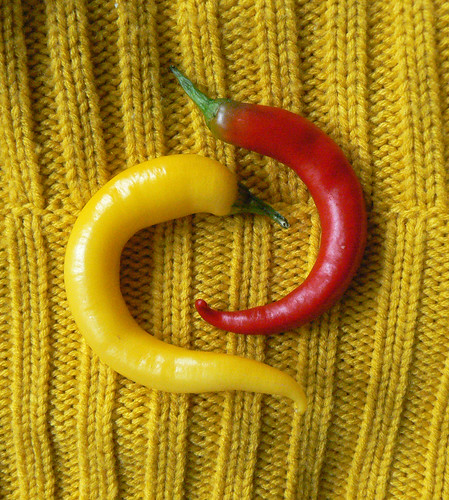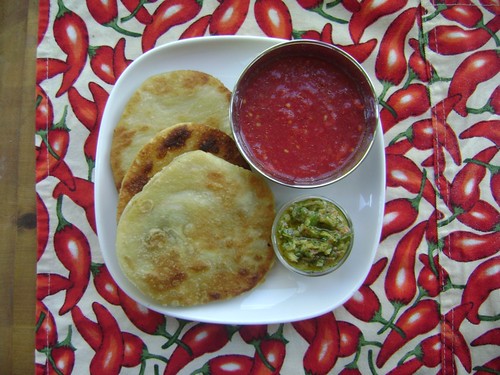Fast End
Here’s hoping those of you who fasted on Yom Kippur have had an easy fasting and that you are all going to be inscribed in the book of life and have a good year of health, peace and truth.
The fast of Yom Kippur in my family has two mythical endings: a hand-picked guava from the nearby tree (a tradition that started with my stepfather’s grandfather, whose eyes filled with tears of joy every time he was about to eat a fruit grown on the holy land), or rushing home from the synagogue to the infamous cilantro-centered Harira soup. In both instances, very aromatic ending to a bland day of fasting with neither food nor water. A bit extreme, especially considering that both guavas and cilantro are quite controversial aromas which usually garner polarized reactions.
With this little piece of family history, I’d like to share with you three cilantro-centered recipes; two of which I mostly owe to my stepfather, blessed be his soul, as one is his own very invention and the other was inherited from my Moroccan side of the family. Lastly, there is a recipe for the Yemanite hot-pepper condiment Zehug which I adopted from my friend Einat.
Asher’s Fresh Cilantro Salad
Cilantro salad has become the symbol of winter in our family. Made with only several vegetables that were abundant in our winter garden, it is full of vitamin-C and also quite delicious (if you like cilantro, that is). Otherwise, it’s just another way to polarize your family…
2 large bunches fresh cilantro leaves,
5-7 small radishes
4 green onions
1/2 red bell pepper
2 tsp. fresh lemon juice
1 tsp. olive oil
- Wash the cilantro and dispose of any brown or old leaves.
- Thinly dice radishes and peppers
- Thinly slice the green onions
- Add lemon juice and olive oil
- Toss and serve as an appetizer, salad or a condiment alongside other dishes
- Especially good accompaniment to avocado sandwiches and various winter soups.
Harira for Yom Kippur According to the Dehan Family
Harira is the national soup of Morrocco and used both by Jews and Muslims to break the fast (of Yom Kippur and Ramadan, respectively). It is my guess that the Jewish Harira is very simple to prepare, because lighting fire and cooking is forbidden during that holy day. The legumes are soaked since the even of Yom Kippur, prepping them for a relatively short cooking time when everyone arrives from the synagogue. It is simply flavoured with cilantro an coriander (and cumin if desired), keeping it simple and comforting. If you are in a real hurry you could even skip the sautéed onion part and go straight to cooking the chickpeas and lentils. Please note that both spices are best when freshly ground, preferably in your mortar and pestle. The other alternative is using a coffee grinder.
1 cup chickpeas (garbanzo) beans
1-1/2 cups green lentils
2 Liters boiling water
1 medium onion, diced
1-3 Tbs. olive oil
1 head garlic, minced
2 large bunches cilantro leaves, washed and chopped
2 tsp. coriander seed, freshly ground
½ tsp. cumin, freshly ground
1 Tbs. Harissa (Morrocan hot pepper condiment) - optional
½ tsp. salt (or to taste)
1 Lemon
- Boil the water
- Rinse the lentils and garbanzo beans.
- Cover the garbanzo beans in water and boil.
- Skim off any foam that forms on the top.
- Cover the pot with the lid and wait while preparing the rest of the ingredients.
- Sautee the onion in olive oil until golden-brown.
- Add the garlic and Harissa and sautee for one more minute.
- Add the soaked and rinsed lentils and cover with boiling water.
- Cook until the lentil soften, than add the garbanzo beans.
- Wash, clean and chop the cilantro leaves
- Add spices to taste.
- Add the cilantro and continue cooking until the lentils and garbanzo beans have softened and the soup has reached a smooth but not too thick consistency.
- Serve with lemon juice.
Einat's Zehug
Zehug is a a Yemanite condiment that is used on breads, as a dip, and to flavour soups and stews. It is especially good with bread, either as a substitute for butter, and avocado in particular. I met my friend Einat in the West End Farmer’s Market a couple of weekends ago while she was stocking up on hot peppers, and the first thing that went through my mind was Zehug. I started collecting hot peppers too and than we both found ourselves having a conversation about Zehug.
The following is loosely the recipe she gave me which turned out simple and great. The key is to use the freshest most flavourful ingredients and grind your spices freshly using a mortar and pestle.
1/2 kg fresh hot peppers – any kind, the hotter the better
2 heads of fresh garlic
¼ cup olive oil (approximately)
2 large bunches of cilantro leaves, rinsed, cleaned and well-dried
2 Tbs. coriander seed, freshly ground
1 tsp. cumin seed, freshly ground
1 tsp. cardamom seed, freshly ground
1 tsp. clove buds, freshly ground
2 tsp. black peppercorns, freshly ground
¼ tsp. sea salt, or to taste
- Cut off the stems of the hot peppers and slice or chop them. Be sure to use gloves for your hands to avoid burning your skin and eyes throughout the day.
- Peel and mince the garlic
- Chop the cilantro leaves
- Using a food processor or a hand-blender, work the mixture of peppers, garlic and cilantro into a paste. Add a bit of olive oil to make the job a little easier.
- Alternatively, if you have sliced your peppers thinly enough, you will be able to make the Zehug using mortar and pestle (and trust me, the flavour and texture would be significantly better).
- Add the spices and adjust to taste.
- Place in a jar and cover with olive oil. Use within 1 week.



